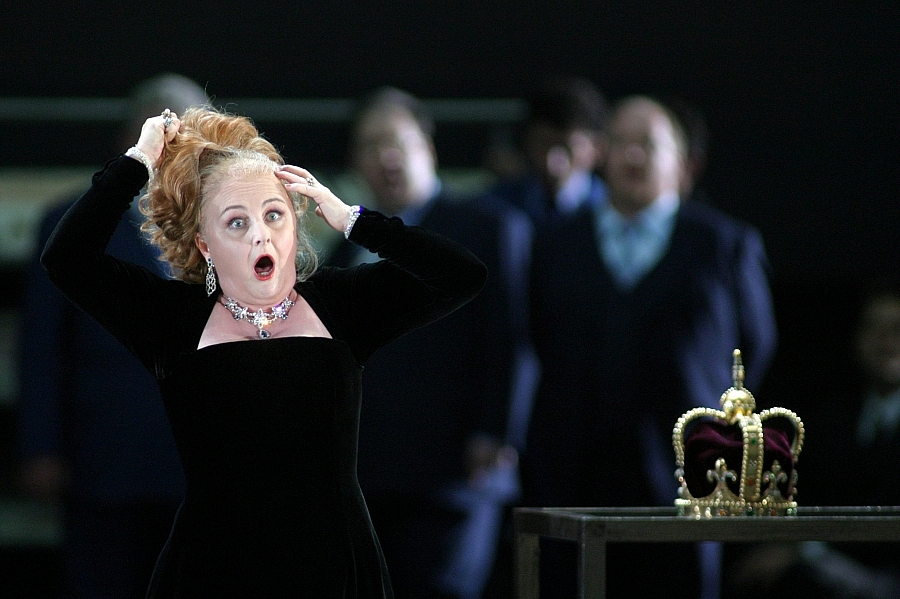ROBERTO DEVEREUX by GAETANO DONIZETTI Libretto: Salvatore Cammarano
Bayerische Staatsoper, seen at the Nationaltheater in Munich, 15th of July 2015

Age is no hindrance, when you are singing. Placido Domingo is 74 years old and has during the last decade gone from tenor roles, to transposing passages down a note or two, to baritone roles that don’t quite suit his voice.
The coloratura legend Edita Gruberova is 69 years old but she makes no compromises. She still goes hell for leather in major roles in operas by Bellini and Donizetti. As a matter of fact, according to Gruberova’s website, she is booked well into 2017 to appear in the major opera houses of Vienna, Tokyo and Munich in productions of Anna Bolena Norma and Lucrezia Borgia.
At the Bavarian State Opera in Munich she now and then makes a very welcome appearance as Elisabetta (Queen Elizabeth I) in Donizetti’s ‘tragedia lirica’ Roberto Devereux. It is clearly one of Gruberova’s signature roles and after seeing her in action I can understand why she is still at it.
Christof Loy’s staging from 2004 depicts the corridors of power in Westminister as a pretty shabby place in need of some freshening up. Sara’s private apartments are no more luxurious. The Duchess of Nottingham lives behind plexiglass screens that are scratchier than a London Underground train. Yes, this is reminiscent of the London I knew in the early 80s, before the property boom.
When Elisabetta (Gruberova) is about to show some steel and sentence her young favourite Deveruex to death, she appears dressed as the Iron Lady in turquoise skirt and jacket with matching beige handbag.
Whenever the choir makes an entrance in the Palace (of Westminster) there is also that distinct whiff of the 80s with the men and women dressed as your typical civil servants, butlers and domestic servants. But here is a missed opportunity, as Roberto Devereux (or the Earl of Essex) is not dressed as your stereotypical ‘Essex or even Mondeo man’. It is a small, perhaps irrelevant detail that probably would only have been picked up by a British audience
But most importantly there is some excellent singing.
There is only one disappointment. The Siberian tenor Alexey Dolgov as Devereux sounded rather dull, made no impression in the cabalettas, but acted his pants off. You can see and hear why Sonia Ganassi continues to be hired as Deveruex’s secret lover Sara by many of the world’s best opera houses. She can be both intensely passionate and love-torn tender. Equally impressive is her husband, the jealous and spiteful Duke of Nottingham (Franco Vassallo). Vassallo is another one, I must admit, of these wonderful Italian baritones that I haven’t encountered before on my operatic travels. Vassallo portrays his character with gusto and his deeply rounded voice makes full use of the open and clear cut vowels that his mother tongue provides.
The odd thing about this opera is that there are many duets but only rarely do the protagonists sing together.
The Slovak soprano Edita Gruberova thrives on her own and is, despite her age, still a force to be reckoned with. Gruberova was for many years the reigning Queen of the Night and perhaps after Beverly Sills the finest Tudor Queen in Donizetti’s trilogy Anna Bolena, Maria Stuarda and Roberto Devereux.

But whereas Mrs Sills declared that taking on Elisabetta in Roberto Deveruex had shortened her career by at least four years, the same role has probably lengthened Gruberova’s life on stage.
Her voice has now lost lustre on the top notes, but she makes up for some of that by totally inhabiting the role from start to finish. It is all there: first the affection she shows Devereux, then the anger, the cold hearted death sentence, followed by doubt, the realisation that she has made a mistake, the blame she puts on the Nottinghams and finally the grief – Gruberova makes it all seem very believable. I guess she could manage the notoriously difficult final scene purely on technique, but this singer has no intention of coasting. She gives the aria ‘Quel sangue versato’ the full whack, and some. The very final Bs and the high D don’t come off and turn into a kind of wail. But it doesn’t matter because Elisabetta has gone mad with sorrow and on her knees hands the power to her nephew, King James VI of Scotland.
Edita Gruberova received a standing ovation and much credit should also go to the conductor Friedrich Haider. He actually re-discovered the score of Roberto Devereux. Although hardly a masterpiece, this is a perfectly dramatic opera, provided all the main roles are sang convincingly.
This production of Roberto Devereux remains on the repertoire and if you value strong acting, you have to see Edita Gruberova as Elisabetta before she passes on her coloratura crown.

